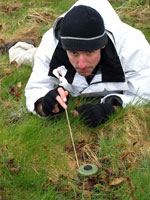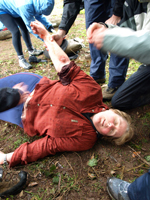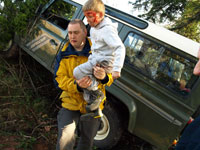 Surving Adventure medical travel course
Surving Adventure medical travel course
April 2008
 I'm in rural Afghanistan, edging my way through a minefield towards
a screaming man spurting blood from the stump of his shattered leg. It's pitch
black, raining with a vengeance and all I'm carrying is a first aid kit and an
improvised mine detector made from cocktail sausage sticks. Apart from the cocktail
sticks perhaps, not the way I usually spend a Saturday night. But then already
today I've stumbled across a knife attack victim in Kenya, treated a hiker for
facial burns in Latvia and bungled a bamboo injury in Belize.
I'm in rural Afghanistan, edging my way through a minefield towards
a screaming man spurting blood from the stump of his shattered leg. It's pitch
black, raining with a vengeance and all I'm carrying is a first aid kit and an
improvised mine detector made from cocktail sausage sticks. Apart from the cocktail
sticks perhaps, not the way I usually spend a Saturday night. But then already
today I've stumbled across a knife attack victim in Kenya, treated a hiker for
facial burns in Latvia and bungled a bamboo injury in Belize.
This isn't some twisted reality TV show (Around the World in 80 Casualties?)
but a new medical course for gap year travellers, charity workers abroad or anyone
exploring off the beaten track. Adventure tourism is exploding in popularity,
and as we travel ever further to experience thrill-packed activities in remote
destinations, we're increasing both physical risks and our distance from professional
medical help.
So forget calmly applying triangular bandages to dummies in the classroom, the
Surviving Adventure weekend with Prometheus Medical throws you right in at the
deep end. Within moments of taking possession of a Lifesystems Explorer medical
kit (co-designed by Prometheus doctors), I'm faced with a shrieking woman covered
in gore and brandishing a fair-sized machete. While that's closer to a typical
night out in West London, my preferred option of running in the opposite direction
while dialling 999 simply isn't possible halfway up a Bolivian mountain (each
exercise has a suitably exotic imaginary setting).
Surviving Adventure is based around a series of 'moulages' – scenarios
where instructors take the part of victims, complete with convincing props, vocal
performances and buckets and buckets of artificial blood. There's little warning
about when casualties might appear or what injuries to expect, although rest
assured you'll get plenty of opportunities to apply dressings, take pulses and
even use some more esoteric bits of medical equipment.
As the weekend progresses, I encounter an army of jet-setting undead – no
sooner have I resuscitated my walking buddy in Cambodia than I find her slumped
over the wheel of a wrecked car in the former Yugoslavia. It's like a cross between
Holby City and Dawn of the Dead, but with better acting.
 The emphasis on timely assistance is a superb way of quickly learning what to
do (and what not to do). Informative medical advice flows as steadily as the
plasma, but the instructors place equal emphasis on practicalities: finding out
what's going on, calling for help, reassuring the casualty and keeping everyone
safe.
The emphasis on timely assistance is a superb way of quickly learning what to
do (and what not to do). Informative medical advice flows as steadily as the
plasma, but the instructors place equal emphasis on practicalities: finding out
what's going on, calling for help, reassuring the casualty and keeping everyone
safe.
It's no coincidence that the Surviving Adventure course takes place just outside
Hereford, close to the regimental HQ of the SAS. All the Prometheus instructors
are ex-Special Forces military, experienced mountaineers, and practising medics
or paramedics. This gives the weekend a distinctly military flavour, with pinpoint
timings, endless cups of tea and basic, high speed meals. But it also inspires
confidence. No matter how remote the destination you're heading to, or how extreme
the adventure you're planning, these guys have been there and done it already,
probably with someone lobbing grenades at them.
With decades of expedition work under their utility belts, the instructors are
walking encyclopedias of oddball medical information. I learn how to remove fish
hooks from faces, manipulate dislocated joints, reseat teeth, mend wounds with
Superglue and treat chest wounds using an empty crisp packet. Apparently, and
somewhat disappointingly, the flavour isn't critical.
The lectures in-between the moulages are almost as rewarding. Sunday morning
kicks off with one doctor's personal slideshow of injuries he's treated. A squaddy's
bum riddled with mosquito bites raises a smile, but the aftermath of a bear attack
is grisly (sorry), and no one who's just bolted a greasy full English breakfast
should be exposed to a close-up of a frostbitten penis.
 There's something inherently credible about a bomb disposal officer with 15 years
of practical experience and all of his original fingers. He says that with over
100 million unexploded anti-personnel mines scattered worldwide – many
in popular trekking locations like Cambodia, Sri Lanka and Croatia - having to
deal with blast injuries is sadly all too plausible. The cocktail sticks, in
case you're wondering, are used to mark a safe route through a minefield that
you've painstakingly cleared, 3cm at a time, using a (non-magnetic) metal or
wooden rod. Good luck with that.
There's something inherently credible about a bomb disposal officer with 15 years
of practical experience and all of his original fingers. He says that with over
100 million unexploded anti-personnel mines scattered worldwide – many
in popular trekking locations like Cambodia, Sri Lanka and Croatia - having to
deal with blast injuries is sadly all too plausible. The cocktail sticks, in
case you're wondering, are used to mark a safe route through a minefield that
you've painstakingly cleared, 3cm at a time, using a (non-magnetic) metal or
wooden rod. Good luck with that.
Possibly even scarier is the Situational Awareness and Hostage lecture, a two-hour
lesson on the psychologies of kidnap that has me looking over my shoulder for
the rest of the weekend. Top tips for potential abductees include 'santitising'
your mobile of compromising phone book entries like 'Mum' (or, presumably, 'MI6').
On the course with me is a group from Land Rover planning an overland trip from
Solihull to Singapore in aid of the British Red Cross. Team leader Sam Mercer
tells me, “These are extreme situations that I hope we 'll never face but
at least now we've got an awareness of the worst case scenarios. The most valuable
part of the course was being put under pressure: we all got stuck in together
as a team and it's given us confidence we didn't have before.”
That's it in a nutshell. Having faced more cuts, burns, fractures, amputations
and heart attacks in 48 hours than even the unluckiest expedition might suffer,
and with my complimentary Lifesystems first aid kit tucked under my arm, I finish
the course feeling ready to tackle anything. Except perhaps that frostbitten
willy.
Surviving Adventure
£
295 www.lifesystems.co.uk/prometheus 01432 276611
Weekends throughout the summer (next confirmed dates 12-13 April, 31 April-1
May).
Return to Independent work page


 I'm in rural Afghanistan, edging my way through a minefield towards
a screaming man spurting blood from the stump of his shattered leg. It's pitch
black, raining with a vengeance and all I'm carrying is a first aid kit and an
improvised mine detector made from cocktail sausage sticks. Apart from the cocktail
sticks perhaps, not the way I usually spend a Saturday night. But then already
today I've stumbled across a knife attack victim in Kenya, treated a hiker for
facial burns in Latvia and bungled a bamboo injury in Belize.
I'm in rural Afghanistan, edging my way through a minefield towards
a screaming man spurting blood from the stump of his shattered leg. It's pitch
black, raining with a vengeance and all I'm carrying is a first aid kit and an
improvised mine detector made from cocktail sausage sticks. Apart from the cocktail
sticks perhaps, not the way I usually spend a Saturday night. But then already
today I've stumbled across a knife attack victim in Kenya, treated a hiker for
facial burns in Latvia and bungled a bamboo injury in Belize.  The emphasis on timely assistance is a superb way of quickly learning what to
do (and what not to do). Informative medical advice flows as steadily as the
plasma, but the instructors place equal emphasis on practicalities: finding out
what's going on, calling for help, reassuring the casualty and keeping everyone
safe.
The emphasis on timely assistance is a superb way of quickly learning what to
do (and what not to do). Informative medical advice flows as steadily as the
plasma, but the instructors place equal emphasis on practicalities: finding out
what's going on, calling for help, reassuring the casualty and keeping everyone
safe.  There's something inherently credible about a bomb disposal officer with 15 years
of practical experience and all of his original fingers. He says that with over
100 million unexploded anti-personnel mines scattered worldwide – many
in popular trekking locations like Cambodia, Sri Lanka and Croatia - having to
deal with blast injuries is sadly all too plausible. The cocktail sticks, in
case you're wondering, are used to mark a safe route through a minefield that
you've painstakingly cleared, 3cm at a time, using a (non-magnetic) metal or
wooden rod. Good luck with that.
There's something inherently credible about a bomb disposal officer with 15 years
of practical experience and all of his original fingers. He says that with over
100 million unexploded anti-personnel mines scattered worldwide – many
in popular trekking locations like Cambodia, Sri Lanka and Croatia - having to
deal with blast injuries is sadly all too plausible. The cocktail sticks, in
case you're wondering, are used to mark a safe route through a minefield that
you've painstakingly cleared, 3cm at a time, using a (non-magnetic) metal or
wooden rod. Good luck with that.